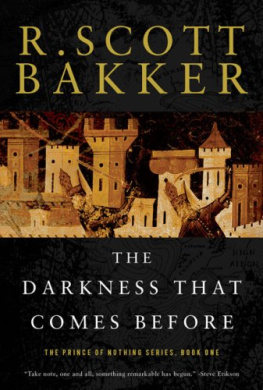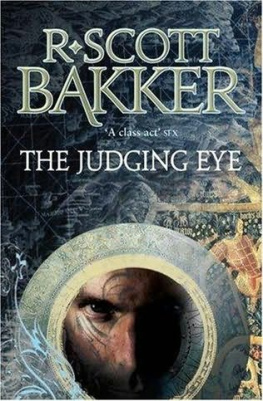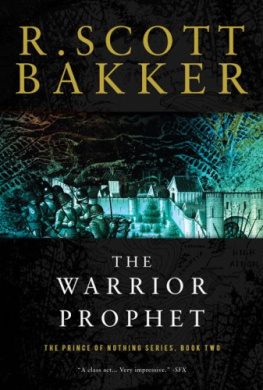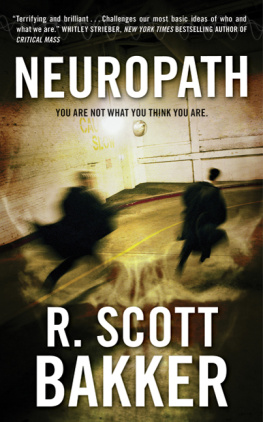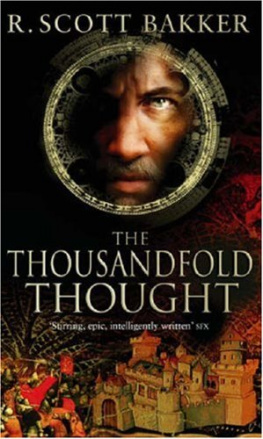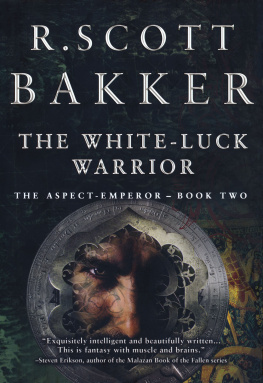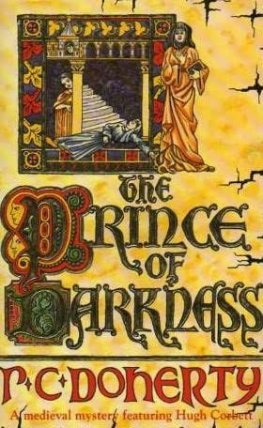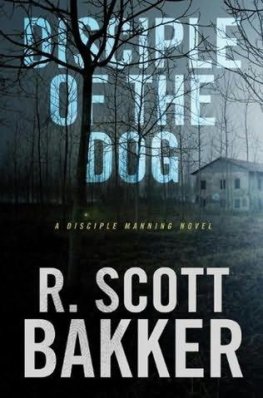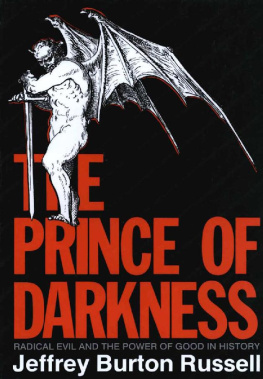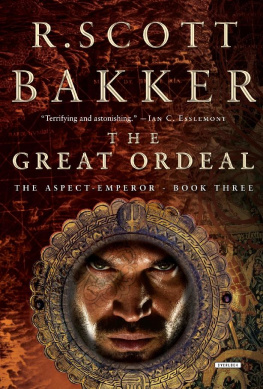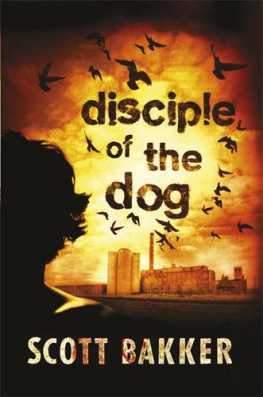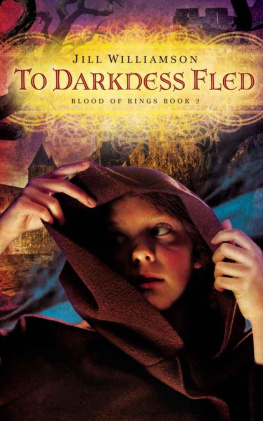Table of Contents
First published in the United States in 2004 by
The Overlook Press, Peter Mayer Publishers, Inc.
Woodstock & New York
WOODSTOCK:
One Overlook Drive
Woodstock, NY 12498
www.overlookpress.com
[for individual orders, bulk and special sales, contact our Woodstock office]
NEW YORK:
141 Wooster Street
New York, NY 10012
Copyright 2003 by R. Scott Bakker
All rights reserved. No part of this publication may be reproduced or
transmitted in any form or by any means, electronic or mechanical, including
photocopy, recording, or any information storage and retrieval system now
known or to be invented, without permission in writing from the publisher,
except by a reviewer who wishes to quote brief passages in connection
with a review written for inclusion in a magazine, newspaper, or broadcast.

The paper used in this book meets the requirements for paper
permanence as described in the ANSI Z39.48-1992 standard.
Library of Congress Cataloging-in-Publication Data
Bakker, R. Scott.
The darkness that comes before / R. Scott Bakker.
The prince of nothing ; bk. 1.
p. cm.
I. Title.
PR9199.4.B356 D.
eISBN : 978-1-590-20385-9
http://us.penguingroup.com
To Sharron
before you, I never dared hope
Acknowledgments
A writers work is solitary, which is, paradoxically, why we owe so much to others. When the threads are few, they must be strong. In light of this, I wish to thank:
My partner, Sharron OBrien, for making this the best book it could be, and for making me a better man than I am.
My brother, Bryan Bakker, for believing in my work before there was any work to believe in.
My friend, Roger Eichorn, for his exhaustive critiques, his penetrating insights, and for his writing, which continually reminds me how it should be done.
My agent, Chris Lotts, whose Kung Fu reigns supreme.
Michael Schellenberg, for seeing possibility in disaster, for forgiving me my foul mouth, and for saying fair enough no matter how bad my arguments. I would also like to thank Tracy Carns for seeing what I see, and everyone at Overlook for their warmth and dedication.
Nancy Proctor for her wonderful and indispensable diary of reader reactions.
Caitlin Sweet for her friendship and advice.
Nick Smith for opening the door, and Kyung Cho for guiding me through.
I would also like to thank everyone who critiqued my chapters on the old DROWW, as well as the Social Sciences and Humanities Research Council of Canada for providing a working class kid with an education he could never have afforded otherwise.
Speaking of which, I need to thank my grade seven teacher, Mr. Allen, for waking me up.
I havent slept a wink since.
For those of you interested in further exploring the Three Seas, be sure to visit Wil and Jacks message board at www.three-seas.com or www.princeofnothing.com
I shall never tire of underlining a concise little fact which these superstitious people are loath to admitnamely, that a thought comes when it wants, not when I want...
FRIEDRICH NIETZSCHE, BEYOND GOOD AND EVIL
Prologue
THE WASTES OF KNIRI
If it is only after that we understand what has come before, then we understand nothing. Thus we shall define the soul as follows: that which precedes everything.
AJENCIS, THE THIRD ANALYTIC OF MEN
2147 Year-of-the-Tusk, the Mountains of Demua
One cannot raise walls against what has been forgotten.
The citadel of Ishul succumbed during the height of the Apocalypse. But no army of inhuman Sranc had scaled its ramparts. No furnace-hearted dragon had pulled down its mighty gates. Ishul was the secret refuge of the Kniric High Kings, and no one, not even the No-God, could besiege a secret.
Months earlier, Anasrimbor Ganrelka II, High King of Kniri, had fled to Ishul with the remnants of his household. From the walls, his sentries stared pensively across the dark forests below, their thoughts stricken by memories of burning cities and wailing multitudes. When the wind moaned, they gripped Ishuls uncaring stone, reminded of Sranc horns. They traded breathless reassurances. Had they not eluded their pursuers? Were not the walls of Ishul strong? Where else might a man survive the end of the world?
The plague claimed the High King first, as was perhaps fitting: Ganrelka had only wept at Ishul, raged the way only an Emperor of nothing could rage. The following night the members of his household carried his bier down into the forests. They glimpsed the eyes of wolves reflected in the light of his pyre. They sang no dirges, intoned only a few numb prayers.
Before the morning winds could sweep his ashes skyward, the plague had struck two others: Ganrelkas concubine and her daughter. As though pursuing his bloodline to its thinnest tincture, it assailed more and more members of his household. The sentries upon the walls became fewer, and though they still watched the mountainous horizon, they saw little. The cries of the dying crowded their thoughts with too much horror.
Soon even the sentries were no more. The five Knights of Trys whod rescued Ganrelka after the catastrophe on the Fields of Elenet lay motionless in their beds. The Grand Vizier, his golden robes stained bloody by his bowel, lay sprawled across his sorcerous texts. Ganrelkas uncle, whod led the heartbreaking assault on Golgotteraths gates in the early days of the Apocalypse, hung from a rope in his chambers, slowly twisting in a draft. The Queen stared endlessly across festering sheets.
Of all those who had fled to Ishul, only Ganrelkas bastard son and the Bardic Priest survived.
Terrified by the Bards strange manner and one white eye, the young boy hid, venturing out only when his hunger became unbearable. The old Bard continually searched for him, singing ancient songs of love and battle, but slurring the words in blasphemous ways. Why wont you show yourself, child? he would cry as he reeled through the galleries. Let me sing to you. Woo you with secret songs. Let me share the glory of what once was!
One night the Bard caught the boy. He caressed first his cheek and then his thigh. Forgive me, he muttered over and over, but tears fell only from his blind eye. There are no crimes, he mumbled afterward, when no one is left alive.
But the boy lived. Five nights later, he lured the Bardic Priest onto Ishuls towering walls. When the man shambled by in a drunken stupor, he pushed him from the heights. He crouched for a long while at the falls edge, staring down through the gloom at the Bards broken corpse. It differed from the others, he decided, only in that it was still wet. Was it murder when no one was left alive?
Winter added its cold to the emptiness of Ishul. Propped on the battlements, the child would listen to the wolves sing and feud through the dark forests. He would pull his arms from his sleeves and hug his body against the chill, murmuring his dead mothers songs and savouring the winds bite on his cheek. He would fly through the courtyards, answering the wolves with Kniric war cries, brandishing weapons that staggered him with their weight. And once in a while, his eyes wide with hope and superstitious dread, he would poke the dead with his fathers sword.


 The paper used in this book meets the requirements for paper
The paper used in this book meets the requirements for paper

